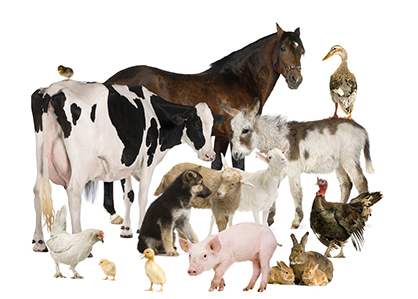Your Hurricane Preparedness Plan Should Include Pets, Livestock!
 Maryland Urges Hurricane Preparedness Plans to Include Pets, Livestock
Maryland Urges Hurricane Preparedness Plans to Include Pets, Livestock
ANNAPOLIS, MD (Sept. 6, 2017) – With Hurricane Irma’s potential approach toward the East Coast, the Maryland Department of Agriculture reminds all animal owners and caretakers to include pets and livestock in all disaster preparedness plans. Disasters such as hurricanes, tornadoes and floods, can occur at any time. The time to prepare for these events is before they occur.
According to the Maryland Emergency Management Agency (MEMA), Maryland is a hurricane prone state. Hurricanes can and have impacted the state as far from the coast as Western Maryland with “inland flooding” of freshwater creeks, streams and rivers due to intense rainfall. After a large and strong storm, heavy wind and water damage can be expected in coastal areas. Hurricanes can spawn tornadoes, flooding, flash flooding, hail and lightening. Most of the fatalities from hurricanes and tropical storms are due to inland floods, and most of the victims are children.
If you must evacuate, remember to take your pets with you and have a plan on where to send them. Red Cross shelters do not allow pets. Maryland has a Pet Sheltering Plan, which will activate when mass care evacuation centers open. If you need to locate a shelter for your cat or dog during an emergency or disaster, listen to the radio for instructions from local civil authorities, or contact the county emergency operations center for the location of a pet-friendly human shelter or other pet shelter for your pet. Anyone in the agricultural community who needs assistance should contact their local emergency operation center. Click here for a list of Local Emergency Center contacts by county.
The Maryland Department of Agriculture recommends the following for domestic pet owners to respond to pet’s needs quickly and safely in the event of disaster evacuation:
- Prepare an animal evacuation kit as detailed by the ASPCA and/or American Veterinary Medical Association.
- Be sure your pet is up to date on all vaccinations as recommended by your veterinarian.
- Have copies of your pet’s vaccination history and medical records to take with you.
- Be sure your pet wears a collar with identification (tattoo, ID tag, microchip, etc.). Include a phone number.
- Have a list of places where you can evacuate with your pet (relatives, pet friendly motels, pet shelters, etc.) if instructed by emergency management personnel.
- Have at least a three-day supply of food, water, and all medication your pet takes, and a few of your pet’s favorite toys. Take them with you if you and your pet are evacuated.
- Have a photo of your pet, in case it gets lost, in addition to leashes, collars, and muzzles, if necessary.
“Your animals depend on you to be prepared in the event of a disaster situation,” said Maryland State Veterinarian Dr. Michael Radebaugh. “Take the extra time now to create a comprehensive disaster plan to ensure the safety and well-being of you, your family and your pets and livestock.”
The department recommends the following for farmers to prepare for hurricanes or tornadoes that may impact their area:
- Move all poultry and livestock to high ground and shelter them in securely battened barns, houses, or tightly fenced areas.
- Cover and secure all water, food, and medical supplies for poultry and livestock.
- Pump and collect adequate supplies of drinking water in case of electrical failures.
- Top off all gasoline, propane, and other fuel tanks.
- Check operations of all portable generators.
- Remove or secure all loose objects that could be moved by high winds.
- Board all glass windows and other similar items that could break from high winds or from objects being blown against them.
- Ensure that all animal holding areas are as clean and sanitary as possible.
- Have available portable radios, extra batteries, flashlights, and candles.
- Follow instructions and advice given by emergency officials.
Notify MDA through MEMA if any agricultural assistance is needed before, during, or after the storm, including injured animals in need of veterinary assistance or dead animals that require disposal.
The ASPCA provides a list of supplies you animal owners and caretakers should have prepared in the event of an evacuation. Visit their website for more information.
The American Veterinary Medical Association has a website dedicated to disaster preparedness which details information on disaster planning for small and large animals. They also offer a helpful brochure titled, “Saving the Whole Family.” Visit their website for more information.
For general information about disaster planning and preparedness, contact the Maryland Emergency Management Agency at 1-877-MEMA-USA or visit mema.maryland.gov/.










